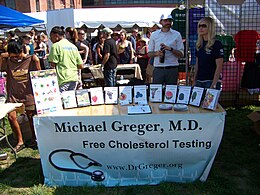Michael Greger
Michael Greger | |
|---|---|
 | |
| Born | October 25, 1972[1][2] |
| Education | Cornell University (BA) Tufts University (MD) |
| Medical career | |
| Profession | General practitioner |
| Field | Clinical nutrition |
| Website | DrGreger.org |
Michael Herschel Greger (born October 25, 1972)[1][2] is an American physician, author, and speaker on public health issues best known for his advocacy of a whole-food, plant-based diet, and his opposition to animal-derived food products.
Career

Greger went to college at Cornell University School of Agriculture, where as a junior he wrote informally about the dangers of bovine spongiform encephalopathy (commonly known as mad cow disease) on a website he published in 1994.[2][4][5] In the same year, he was hired to work on mad cow issues for Farm Sanctuary, near Cornell, and became a vegan after touring a stockyard as part of his work with Farm Sanctuary.[2] In 1998, he appeared as an expert witness testifying about bovine spongiform encephalopathy when cattle producers unsuccessfully sued Oprah Winfrey for libel over statements she had made about the safety of meat in 1996.[2][6]
He enrolled at Tufts University School of Medicine, originally for its MD/PhD program, but then withdrew from the dual-degree program to pursue only the medical degree.[7] He graduated in 1999 as a general practitioner specializing in clinical nutrition.[2] In 2001, he joined the Organic Consumers Association to work on mad cow issues, on which he spoke widely as cases of the disease appeared in the US and Canada,[2][8][9][10] calling mad cow "The Plague of the 21st Century."[11][12][13]
In 2004, he launched a website and published a book critical of the Atkins Diet and other low carb diets.[2]
In 2004, the American College Of Lifestyle Medicine was formed in Loma Linda,[14] and Greger was a founding member[2] as one of the first hundred people to join the organization.[15]
In 2005, he joined the farm animal welfare division of the Humane Society as director of public health and animal agriculture.[2] In 2008, he testified before Congress[16] after the Humane Society released its undercover video of the Westland Meat Packing Company, which showed downer animals entering the meat supply, and which led to the USDA forcing the recall of 143 million pounds of beef, some of which had been routed into the nation's school lunch program.[17]
In 2011, he founded the website NutritionFacts.org[18] with funding from the Jesse & Julie Rasch Foundation.[19]
Greger is a Research Advisory Committee member of The Vegan Society.[20]
Dietary recommendations
In his lectures, videos, and writings about nutrition, Greger tries to persuade people to change their eating habits from a Western pattern diet to a whole-food, plant-based diet, which he says can prevent and reverse many chronic diseases.[21][22]: 10 He is critical of some other doctors for not encouraging their patients to adopt plant-based diets and to avoid animal-based products[22]: 1–12 and has criticized the USDA, stating that "a conflict of interest right in their mission statement" protects the economic interests of food producers in lieu of clear dietary guidelines.[23]
Reception
Greger's third book, Bird Flu: A Virus of Our Own Hatching, received a favorable review which said it was "interesting and informative to both scientists and lay persons",[24] but public health expert David Sencer was critical of the book, writing that it "focuses heavily on doomsday scenarios and offers little in terms of practical advice to the public" and that "a professional audience would quickly put [the book] aside for more factually correct sources of information".[25]
His fourth book, How Not to Die, made The New York Times Best Seller list at least three times.[26][27][28]
In 2024, Morgan Pfiffner of Red Pen Reviews gave his sixth book, How Not to Diet a score of 50% for its scientific accuracy and a score of 75% for its healthfulness.[29] Pfiffner commented that "While much of the book is well supported by research, there are a significant number of fairly questionable claims, leading to a handful of dietary recommendations that seem unnecessary, too restrictive, or potentially counterproductive".[29] One of Greger's questionable claims is that a whole food plant-based diet can reverse heart disease. According to Pfiffner this has not been demonstrated as the randomized controlled trial that he cited from Dean Ornish did not show regression of atherosclerotic plaque.[29]
Harriet A. Hall has written that, while it is well-accepted that it is more healthy to eat a plant-based diet than a typical Western diet, Greger often overstates the known benefits of such a diet as well as the harm caused by eating animal products (for example, in a talk, he claimed that a single meal rich in animal products can "cripple" one's arteries), and he sometimes does not discuss evidence that contradicts his strong claims.[30]
Joe Schwarcz of McGill University has commented that although Greger takes his information from respected science journals and produces impressive videos, he has a vegan agenda and is known for cherry picking of data.[31]
Publications
- Heart Failure: Diary of a Third-Year Medical Student (2000)
- Carbophobia: The Scary Truth Behind America's Low Carb Craze (2005).
- Bird Flu: A Virus of Our Own Hatching (2007)
- How Not to Die: Discover the Foods Scientifically Proven to Prevent and Reverse Disease. (Hardcover) (2015) (with Gene Stone).
- The How Not to Die Cookbook: 100+ Recipes to Help Prevent and Reverse Disease (with Gene Stone & Robin Robertson) (Hardcover) (2018) ISBN 978-1-250-12776-1
- How Not to Diet: The Groundbreaking Science of Healthy, Permanent Weight Loss (Hardcover) (2019) ISBN 978-1-250-19922-5
- How to Survive a Pandemic (Paperback) (2020) ISBN 978-1-250-79323-2
- How Not to Age: The Scientific Approach to Getting Healthier as You Get Older (Hardcover) (2023) ISBN 978-1-250-79633-2
- OZEMPIC: Risks, Benefits, and Natural Alternatives to GLP-1 Weight-Loss Drugs (Paperback) (2024) ISBN 979-8991660501
See also
- PlantPure Nation (2015), a documentary film that advocates for a whole food, plant-based diet
- What the Health (2017), a documentary film which critiques the health impact of meat, fish, eggs and dairy products consumption
- Seaspiracy (2021), a documentary film about the environmental impact of fishing
- You Are What You Eat: A Twin Experiment (2024), a documentary that put identical twins on competing diets: omnivore and vegan
References
- ^ a b Greger, Michael [@nutrition_facts] (October 25, 2014). "It's my birthday today! To express your appreciation for my work, please consider making a tax-deductible donation" (Tweet). Archived from the original on September 5, 2018. Retrieved September 5, 2018 – via Twitter.
- ^ a b c d e f g h i j Mandy Van Deven (2010). "Greger, Michael 1972–". In Margaret Puskar-Pasewicz (ed.). Cultural Encyclopedia of Vegetarianism. Santa Barbara, CA: Greenwood. p. 123. ISBN 9780313375569.
- ^ "AWESOME! Story of Michael Greger, MD and Hall of Fame". YouTube. Archived from the original on December 21, 2021. Retrieved January 31, 2020.
- ^ Greger, Michael (1994). "Mad Cow Disease – Much More Serious Than AIDS". Envirolink. Archived from the original on December 24, 1996.
- ^ "1996 Interview with Michael Greger". www.mad-cow.org.
- ^ Usborne, David (February 26, 1998). "Oprah triumphs over the Texas cattle ranchers". The Independent. Archived from the original on May 12, 2022.
- ^ Greger, M (1999). "About the Author". United Progressive Alumni. Archived from the original on March 2, 2000.
- ^ "The odds against finding mad cow disease: North America's meat inspection rules leave a lot to be desired, a U.S. expert says". The Vancouver Sun via Lexis-Nexus. June 7, 2003.
- ^ Parker-Pope, Tara (May 27, 2003). "Beef Industry's Dirty Secret: U.S. Lags on Safety Standards". The Wall Street Journal. Archived from the original on September 15, 2016. Retrieved April 4, 2024.
- ^ "Mad cow disease; USDA misleads public on beef safety." Washington Times [Washington, DC] 2 Jan. 2004: A17. Infotrac Newsstand. Web. 1 Sept. 2016.
- ^ Davidson, S. (2004, Jan 29). MIT to hold forum on mad cow disease; local physician to give keynote address. Jewish Advocate. Retrieved from Proquest. Quote: "Consumers concerned about mad cow disease and other issues about safeguarding the food supply may want to attend the Jan. 29 lecture at MIT by Michael Greger, M.D., entitled "Mad Cow Disease: Plague of the 21st Century?" ... Greger was raised in a small Arizona town, "the only Jewish family within 30 miles." His parents were New York natives; his mother taught Biblical Hebrew at the community college. Following his parents' divorce, he moved with his mother and brother to Binghamton, N.Y., where she taught Hebrew school at the orthodox Beth Israel synagogue."
- ^ "Confused About Mad Cow? New Ad Exposes Scaremongers and Dispels Myths." PR Newswire 5 Jan. 2004. Academic OneFile. Web. 1 Sept. 2016.
- ^ Greger, Michael (Winter 2004). "The killer among us: Could mad cow disease already be killing thousands of Americans every year?" (PDF). EarthSave News Vol 15 No. 1. p. 5.
- ^ "American College Of Lifestyle Medicine". California Explore. Retrieved September 1, 2016.
- ^ "Michael Greger MD, FACLM, DipABLM". American College of Lifestyle Medicine. January 22, 2024. Retrieved April 4, 2024.
- ^ Schmit, Julie (March 5, 2008). "Meat plant concerns raised for years". USA Today.
- ^ Kesmodel, David; Zhang, Jane (February 25, 2008). "Meatpacker in Cow-Abuse Scandal May Shut as Congress Turns Up Heat". The Wall Street Journal. Archived from the original on June 17, 2018. Retrieved April 4, 2024.
- ^ Greger, Michael (April 15, 2011). "Welcome to NutritionFacts.org!". NutritionFacts.org.
- ^ "Featured Projects". The Jesse and Julie Rasch Foundation. Archived from the original on September 9, 2016. Retrieved September 1, 2016.
- ^ " Dr Michael Greger". vegansociety.com. Retrieved 20 July 2022.
- ^ "Vegan, Plant-Based Diet or… What Label Works?". T. Colin Campbell Center for Nutrition Studies. October 16, 2015.
- ^ a b Greger, Michael (2015). How Not to Die: Discover the Foods Scientifically Proven to Prevent and Reverse Disease. Flatiron Books. ISBN 9781250066114.
- ^ Gustafson, C (April 2014). "Michael Greger, md: Reversing Chronic Disease Through Diet; Addressing the 2015 USDA Dietary Guidelines Committee". Integrative Medicine: A Clinician's Journal. 13 (2): 22–4. PMC 4684122. PMID 26770088.
- ^ Pekosz, Andrew (September 4, 2007). "Book Review. Bird flu: A virus of our own hatching". J Clin Invest. 117 (9): 2350. doi:10.1172/JCI33078. PMC 1952640.
- ^ Sencer DJ (2007). "Bird Flu: A Virus of Our Own Hatching". Emerging Infectious Diseases (Book review). 13 (11): 1802–1803. doi:10.3201/eid1311.070787. PMC 3375804.
- ^ "Best Seller List – Advice, How-To & Miscellaneous – Dec. 27, 2015". The New York Times. December 27, 2015.
- ^ "Best Seller List – Advice, How-To & Miscellaneous – Jan. 3, 2016". The New York Times. January 3, 2016.
- ^ "Best Seller List – Advice, How-To & Miscellaneous – Jan. 10, 2016". The New York Times. January 10, 2016.
- ^ a b c Pfiffner, Morgan (2024). "How Not to Diet: The Groundbreaking Science of Healthy, Permanent Weight Loss". Red Pen Reviews. Archived from the original on February 19, 2024.
- ^ Hall HA (February 12, 2013). "Death as a Foodborne Illness Curable by Veganism". Science-based Medicine. Retrieved December 13, 2015.
- ^ Schwarcz, Joe. (2017). "Dr. Michael Greger--What do we make of him?". mcgill.ca. Retrieved 20 July 2022.
External links
 Media related to Michael Greger at Wikimedia Commons
Media related to Michael Greger at Wikimedia Commons- Official website

- Michael Greger at IMDb
- 1972 births
- Living people
- 20th-century American physicians
- American Ashkenazi Jews
- American food writers
- American founders
- American nutritionists
- American people of Jewish descent
- American primary care physicians
- American veganism activists
- Cornell University College of Agriculture and Life Sciences alumni
- Plant-based diet advocates
- Tufts University School of Medicine alumni
- Vegan cookbook writers
